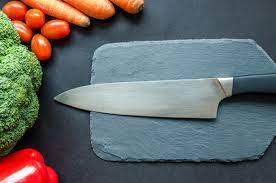Your Cart is Empty
FREE Worldwide Shipping! | +1 365 654 6605
FREE Worldwide Shipping! | +1 365 654 6605
February 22, 2024 4 min read

As a culinary enthusiast, you understand the importance of having the right tools in your kitchen. And, there's no tool more fundamental than a good knife. But is it worth investing in a high-quality kitchen knife? This article intends to examine why you should opt for a top-tier kitchen knife and how it can reshape your culinary experience. The world of kitchen knives is vast and varied, with an array of types, materials, and prices. It's easy to feel overwhelmed and opt for something affordable and convenient. However, as with many things in life, you get what you pay for. Buying cheap knives might seem like a sound decision initially, but it can come with a host of issues down the line. A high-quality kitchen knife is not just a cooking utensil - it's an investment. A good knife will last longer, provide superior performance, and maintain its sharp edge, justifying the initial outlay. If you're passionate about cooking, don't compromise when it comes to kitchen knives. The difference in performance between a cheap knife and a good one is stark and can significantly impact your cooking experience. Cheap kitchen knives may be tempting due to their low price, but they often come with hidden costs. They dull quickly, their handles may deteriorate or break, and sharpening them isn't straightforward. Once they've served their purpose, they're only good for taking up space. When that happens, your only option is to buy a new set, repeating the cycle of waste and expense. In contrast, high-quality kitchen knives are a worthwhile investment. They may require a significant initial outlay, but they will last and save you money in the long run. For instance, if a $50 set of knives loses its edge and falls apart in a year, you'll spend $500 on kitchen knives over a decade. On the other hand, a set of quality knives costing $400 and lasting at least 10 years will save you money. The material of your kitchen knives greatly influences their performance and durability. Quality knives are often made from materials like ceramic, carbon steel, and stainless steel, which allow the knives to maintain their sharp edge better than cheaper alternatives. Hence, investing in knives made from such materials is a smart move for any dedicated home cook. A high-quality knife provides a better edge, which is crucial for efficient and safe cooking. A sharp blade gives you greater control over your cutting and chopping, making it a less risky and more predictable process. A professional chef's knife is designed to be sharper and to maintain its sharpness longer, thereby enhancing your culinary experience. The chef's knife is the workhorse of the kitchen, designed to handle a multitude of tasks. From chopping vegetables to slicing fruits and cutting meat, a chef's knife is the ultimate multi-purpose tool. It's the one knife that professional chefs always have at hand. A well-crafted, sharp chef's knife makes a world of difference in your food preparation process, making it smoother and more enjoyable. While knife sets may seem like a good deal, they often contain unnecessary knives that take up space and resources. The more knives in a set, the more likely they are to be of lower quality. Instead of investing in a set, it's advisable to spend your money on a single, high-quality chef's knife that meets most of your cooking needs. While a chef's knife can handle most kitchen tasks, having a few specialized knives can be beneficial. A paring knife is great for small fruits, a boning knife is ideal for carving a bird, and a bread knife is a must for any household. However, your primary investment should be in a top-quality chef's knife. There's an ongoing debate in the culinary world about whether Japanese or German style knives are superior. Japanese knives typically have a sharper edge due to a narrower cutting angle, making them ideal for slicing through meat and fish without damaging the protein's cellular structure. Conversely, German knives are heavier and can handle tougher tasks, like cutting through hard vegetables or frozen food. Both styles have their merits and can be a valuable addition to your kitchen, depending on your cooking needs. Once you've invested in good quality knives, it's crucial to maintain them properly. Keep them sharp, clean, and dry to prevent rust and ensure they last for years. Learning how to sharpen your knives is a valuable skill that will enhance your cooking experience and extend the lifespan of your knives. Investing in high-quality kitchen knives is a decision that any dedicated cook won't regret. While the initial cost may seem high, the long-term benefits in terms of performance, durability, and ease of use make it a worthwhile investment. So, if you're serious about your culinary journey, spend a little more on your kitchen knives. It's a decision you won't regret.Introduction
The Importance of a Good Knife
The Downside of Cheap Knives
The Investment Value of Quality Knives
The Material Matters
The Edge Advantage
The Role of the Chef's Knife
The Problem with Knife Sets
The Right Knife for the Right Task
Japanese vs German Style Knives
Maintaining Your Knives
Conclusion
References
Be the first to know about upcoming sales and promos. Get a 10% discount coupon when you subscribe!